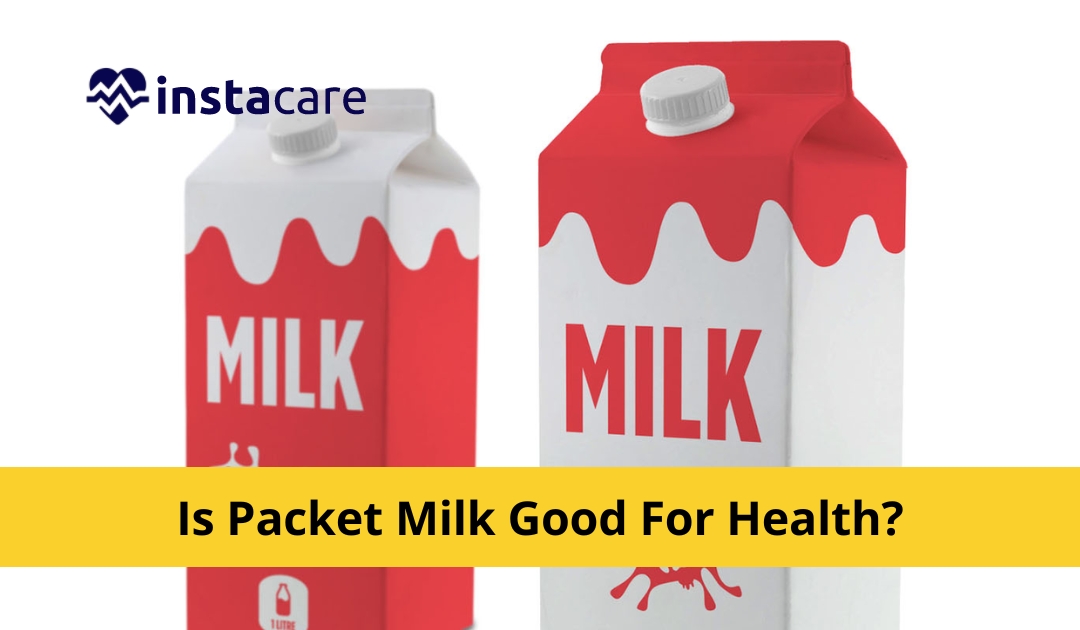Milk is known for being a great and nutritious source of calcium, proteins and other essential vitamins and minerals. But what about packet milk? Many people are unaware that there are several different kinds of packaged milks available in the market - each with their own health benefits (or lack thereof).
Packet milk has become increasingly popular among busy individuals looking to get their daily intake of important nutrition on-the-go. In this blog post, we will take an in-depth look at the pros, cons & health benefits of packet milk so you can make an informed decision before adding it to your diet.
What is packet milk?
Packet milk is a type of milk that is purchased in small portions, as opposed to a more traditional large carton or jug. It is most commonly found in urban areas, making it an ideal purchase for those who are living in smaller spaces or apartments. The majority of packet milk contains pasteurised homogenized cow’s milk, but it can also be bought with other flavours and alternatives added such as chocolate, strawberry and soy.
Commonly available in individual 200ml sachets, packet milk must be refrigerated at all times and should be consumed within three days of opening. Conveniently sized and usually sold at a lower price than larger cartons or jugs, packet milk is a great option for those trying to watch their budget.
Where does it come from?
Packet milk is made from pasteurized cow’s milk, or in some cases, goat's milk or a combination of milks. The milk is sourced from farms which practice animal welfare approved or organic production methods. Then the milk is processed and packaged for sale. It may go through additional processes such as homogenization, separation and fortification.
Finally, it is ready to be placed into its familiar convenient carton packaging. Packet milk has come a long way over time and today is available in the form of ultra-high temperature (uht) milk, powdered milks, flavoured milks and more!
View More: 5 Amazing Health Benefits Of Mutton
Farm fresh milk
Farm fresh milk is a delicious, nutrient-rich alternative to store bought milk. That pleasant, creamy taste that comes with farm fresh milk is due to the high-quality care and attention given to the animals. Cows are fed balanced diets that sustain healthy production of milk and provide them with essential vitamins and minerals.
Not only that, but these cows often live out in the sunshine and roam open pastures, which has been proven to produce higher quality milk than cows that are kept indoors in nonnatural environments. Farm fresh milk gives us access to these amazing benefits without any of the additives or preservatives found in most milks you’d find elsewhere . So next time you go grocery shopping, opt for farm fresh milk – it’s worth it!
Types of milk available
Milk is a beloved beverage that has been consumed for centuries in many forms. Although cow's milk is the most common type, there are several options available to those looking for alternatives. Soy milk and almond milk are both dairy-free options that are made from plant-based ingredients. For those with sensitivities, rice milk is also offered as an alternative without added sugars or starches.
Oat milk can be used in coffee drinks as a substitute for heavy cream and it is even used in some ice creams as a dairy alternative. Coconut milk can jazz up smoothies with its subtle coconut flavor while goat's milk may provide extra protein. Ultimately, anyone who wants to explore different types of milk will discover an abundance of options to choose from!
Difference between farm fresh milk and packet milk
When it comes to evaluating different types of milk, farm fresh milk and packet milk present very different options. While packet milk is found in most supermarkets, farm fresh milk comes from cows that are typically on an actual farm – a far more natural and wholesome environment for the cows. Farm fresh milk is generally much fresher than packet milk as it does not need to be processed and packaged before reaching consumers.
Additionally, the amount of preservatives used in the product can vary considerably, with packer milk often containing more preservatives than farm fresh milk since those added ingredients help keep the product shelf-stable or longer. In terms of taste, many people agree that farm fresh milk tends to have superior flavor over packet milk. It is definitely worth trying both so that one can form their own opinion on this topic!
What are the pros of packet milk over other types of milk?
Packet milk offers several benefits over cow's milk and almond milk, making it the ideal choice for many. For starters, packet milk has a longer shelf life compared to cow's milk and almond milk, allowing for easy storage without needing to be refrigerated.
Additionally, packet milk often contains useful micronutrients such as carotene and zinc which can help to maintain balance in our diets, whilst also providing essential vitamins such as vitamin a and vitamin d that contribute to a healthy lifestyle. Furthermore, packet milk is usually much more affordable than cow's or almond milk, providing an economical solution for those on a budget. All these advantages make packet milk a great alternative to other types of dairy or non-dairy products.
Are there any health benefits associated with drinking packet milk regularly vs other types of milk on the market today?
Packet milk is a great option to include in your daily diet as compared to other types of milk available on the market today. It is rich in calcium and vitamin d, both of which are important for healthy bones. Its protein content can also help to promote muscle recovery after exercise, making it an ideal choice for athletes and fitness enthusiasts alike.
Additionally, packet milk is fortified with additional vitamins and minerals such as zinc, phosphorus, magnesium and riboflavin - all essential nutrients that support a strong immune system. Regular consumption of packet milk can provide numerous health benefits over lower-quality milks found at the grocery store. Health conscious consumers may wish to switch to packet milk for not only its health advantages but also its consistency and taste.
How to store and use packet milk for maximum shelf life?
Storing and using packet milk for maximum shelf life is easy if you know a few key points. Start by storing it in a cool, dark place away from direct sunlight. For short-term storage, this could be inside your fridge - just make sure to store the milk at the back since this is usually cooler than the door shelves. When it comes to using your milk, do not open any packets until you are ready to use them, as opening can reduce shelf life and increase the risk of bacteria growth.
If possible, buy small quantities of milk that you will use up quickly. Whenever possible, try to pour out hot drinks first before pouring out cold drinks and always use clean kitchen utensils when serving. Finally, remember to discard any unused milk within 24 hours of opening or after one week - whichever arrives sooner. With these tips in mind, you'll have tasty milk every time!
Recipes that include packet milk as a main ingredient
For those looking to switch up their cooking routine, trying recipes that require packet milk as a main ingredient can make all the difference. Packet milk is dried milk powder that can be stored in rooms with high humidity and temperatures. It's great for baking and has a creamy flavor that adds an extra edge to many dishes.
Try making whipped desserts like mousse or angel food cake with packet milk, or get creative and wow your guests with a delectable chowder or pudding. With some culinary intuition and a few ingredients, your next dish could be tastier than ever before!
View More: Various Anjeer Benefits You Must Know About
Is packed milk good for health?
Packed milk, also sometimes known as uht (ultra high temperature) milk and long-life milk, can be a convenient choice for consumers. It doesn't need to be refrigerated until opened, so it can have a much longer shelf life. However, it's important to understand that this convenience comes with a few drawbacks. While packed milk is usually pasteurized like regular cow's milk, it does not contain good bacteria like probiotics or calcium in the same form.
And because uht treatment has an effect on the flavor of the milk, some people find it unlikeable compared to fresh cow's milk. Ultimately, the decision lies with each consumer as to what tastes best and provides their health with the nutrients they are looking for.
Why is fresh milk the best?
Fresh milk offers a taste that you can't find in any other dairy product. Its distinct flavor will put a smile on your face with each sip and it has countless health benefits as well. Studies have shown that fresh milk contains essential vitamins and minerals like calcium, vitamin b3 and vitamin b 12 that are the perfect choice for growing bones, maintaining healthy muscle function and improving digestion.
It also has higher levels of proteins than other dairy products which helps maintain strong teeth and bones. Furthermore, fresh milk does not contain any added sugar or preservatives which further enhance its nutritional contents. Not only is it incredibly delicious but it's also incredibly nutritious; making it the best milk to choose for a healthy lifestyle.
Please book an appointment with the best Nutritionist in Lahore, Karachi, Islamabad, and all major cities of Pakistan through InstaCare, or call our helpline at 02137136090 to find a verified doctor for your disease.











